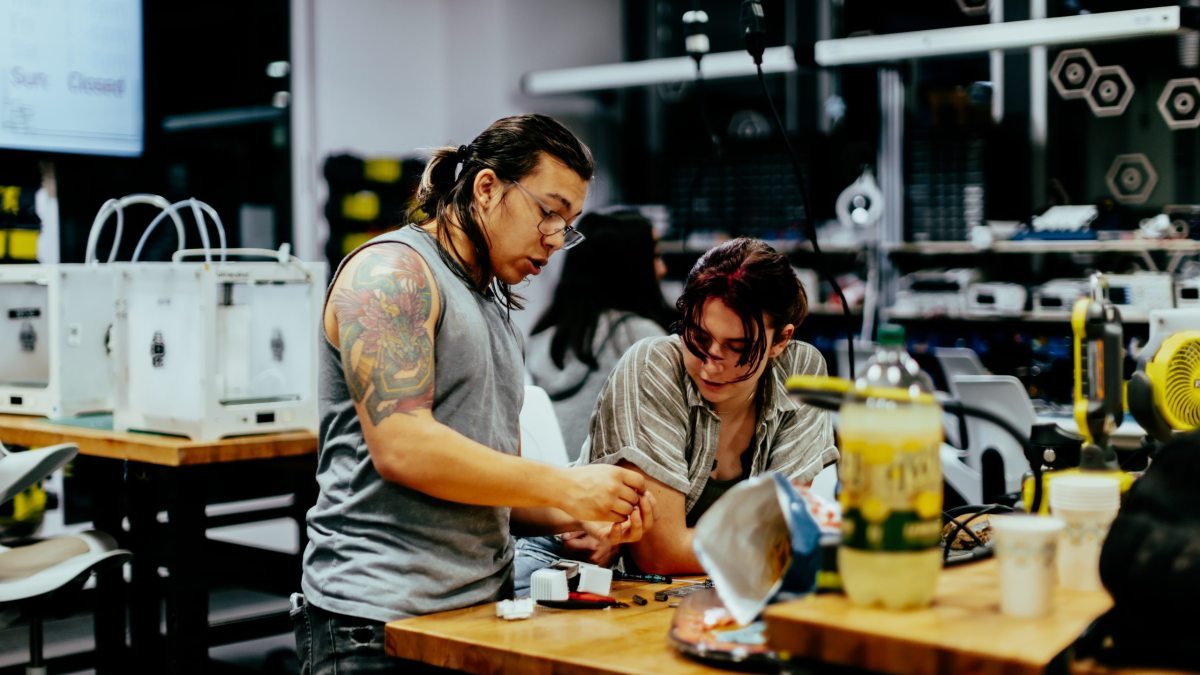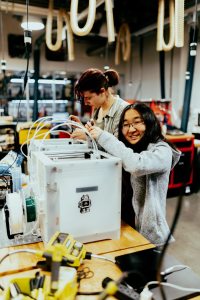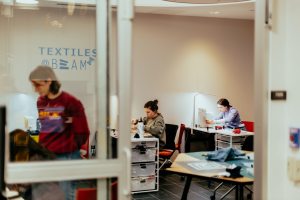Communities of practice at BeAM use peer-to-peer learning to deepen skills
The Be a Maker Network's Communities of Practice is helping more Tar Heels become makers, teaching students to use the tools and equipment that fill Carolina's makerspaces.


Kelly Yun and Maggie Ambrose performing basic maintenance on the Printer Core for the Ultimaker S3. (Photo by Orlando Hernandez)
If you want to see collaboration in action, look no further than Communities of Practice at BeAM makerspaces. You will find student staff – known as facilitators – learning alongside their peers as they engage with the makerspace’s many offerings.
Lindsey Pegram ‘23 has been a CoP facilitator in the woodshop and textile tool areas for two semesters. As Pegram guides members of each learning group, or cohort, through experiential learning activities, she now understands that being a leader is about much more than simply teaching others.
“It’s really about collaborating with and learning from others, while having the humility to express when you do not feel confident about something and allowing others to help you,” she shares.
For Pegram, who is currently pursuing her bachelor’s degree in public health in environmental health sciences at Department of Environmental Sciences and Engineering, peer-to-peer learning is important because it highlights that facilitators are learning alongside cohorts.
“The specialist staff that lead CoPs are not teachers or experts. Instead, they are facilitating a collaborative and supportive environment in which they are learning alongside other members of the CoP,” she says. “Each student shares the responsibility of learning and teaching in order to improve the collective knowledge of the group.”
Pegram relates an example of problem-solving and valuable peer-to-peer learning in the woodshop. “BeAM staff tasked student facilitators to figure out how certain machines worked but without directions on how to do so. I found videos and resources and asked questions to learn the machine’s function so I could then teach others,” she explains.
While she notes such an exercise could be intimidating, Pegram embraced the challenge. “Opportunities like this help learners not only become better acquainted with how the machines work, but also how to use them to complete projects. Plus, seeing my fellow peers instruct each other was an awesome way to see how these types of workshops inspire collaboration.”

Maggie Ambrose, Lindsey Pegram, and Claire Friesen collaborate on sewing projects during Textiles Communities of Practice. (Photo by Orlando Hernandez)
According to BeAM’s Education Program Manager Anna Engelke, the program offers a flexible learning environment in which sessions are informal, collaborative and can adapt to each cohort’s interest areas. “Student staff are the first line of support in BeAM, so they need to be knowledgeable and confident in their work,” she explains. “Sometimes student staff won’t know the answer, so they learn alongside MakerSpace users. This results in mutually beneficial learning experiences for both students and staff.”
To evaluate the program’s success, surveys are given to CoP facilitators before and after rotations through tool areas to self-assess their confidence in these skills. “By the end of the fall 2022 semester, new student staff were on average 82% more confident with teaching others about makerspace tools. Students are getting better opportunities to communicate with and rely on each other, pull on resource networks, and practice professional skills,” Engelke says.
“CoP is a great way to strengthen the BeAM community through supportive peer-to-peer engagement in an ongoing, sustainable way,” Engelke concludes. “Students and staff can work on their own professional development while strengthening connections to the MakerSpace and each other.”
Communities of Practice at BeAM are made possible with KEEN funding.




